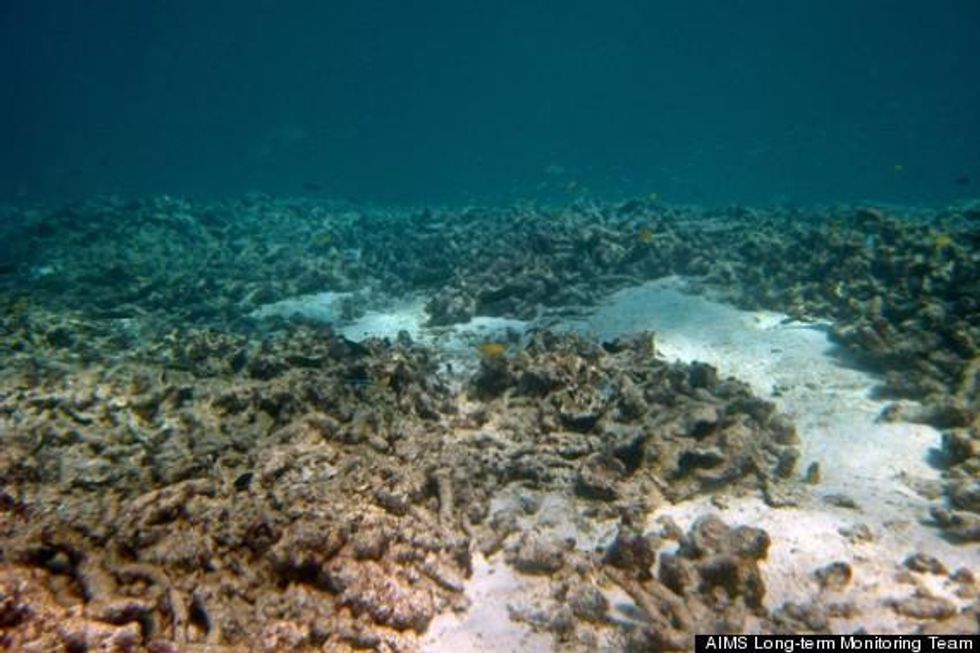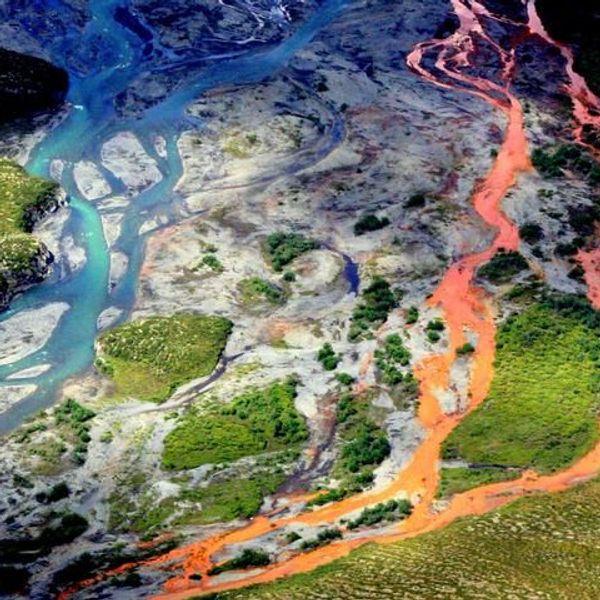Scientists: Climate Change Could Cause Coral Reef Extinction
Dwindling fish size and stock may lead to food insecurity
A top marine scientist said Tuesday that climate change could cause large reef-building corals--such as Australia's Great Barrier Reef--to be extinct within this generation.
The comments, by Matthew Huelsenbeck of Oceana, follow two new studies that contribute damning evidence that climate change is contributing to the decline of marine life around the world.
More than half of the coral cover of Australia's Great Barrier Reef has disappeared since 1985, and the remaining reef is in jeopardy, according to a study published Monday by the National Academy of Sciences Journal.
And research from the University of British Columbia found that global warming will likely cause fish to shrink in size by as much as 24 percent by 2050, The Guardian reported.
"Healthy coral reefs may be something we can only see in photographs pretty soon," Huelsenback told Common Dreams. Several factors, including ocean acidification, severe bleaching and rising water temperature are contributing to the decline, but he said the exact cause may not matter.
"It's up in the air about what's going to be the nail on the coffin, but we can pretty much predict the coffin is coming," he said.
Reef cover at Australia's Great Barrier Reef declined from 28 percent to 13.8 percent during the last 27 years, with two-thirds of that decline occurring in the last 14 years, The Independent reported.

The World Heritage Site generates $6 billion a year in tourism for Australia. But according to the study, tropical cyclones, coral predation by crown-of-thorns starfish and coral bleaching accounted for 48 percent, 42 percent and 10 percent of the respective estimated losses, amounting to a 3.38 annual mortality rate.
Coral bleaching is caused by high water temperatures due to climate change, while crown-of-thorn starfish, in ever-increasing numbers, eat coral.
"A single crown-of-thorns starfish can lay 60 million eggs and their larvae thrive on the plankton blooms that result from high levels of nutrients coming off the land," Katharina Fabricius, a coral reef ecologist at the Australian Institute of Marine science and co-author of the study, told Inter Press Service.
Reducing populations of crown-of-thorns starfish, improving water quality by reducing agricultural run-off, and developing alternative control measures could prevent further coral decline and improve the outlook for the Great Barrier Reef, study authors conclude.
"Such strategies can, however, only be successful if climatic conditions are stabilized, as losses due to bleaching and cyclones will otherwise increase."
At present rates of decline, the coral cover will halve again within a decade, The Guardian reported.
Decreased individual fish size and dwindling fish stocks are also likely in the next four decades, Professor William Cheung of the University of British Columbia, who led another study, told The Guardian.
"The metabolic rate of fish in the warm oceans increases and therefore they need more oxygen," said Cheung, whose work is published in Nature Climate Change, but less oxygen is available, and fish will also migrate to cooler regions as the ocean grows warmer.
Huelsenbeck said the shrinking fish size and stocks will have "very significant" implications for the poorest of fishermen, "who live very close to the shore and can't chase fish all around the world. It's a serious food security issue."
An Urgent Message From Our Co-Founder
Dear Common Dreams reader, The U.S. is on a fast track to authoritarianism like nothing I've ever seen. Meanwhile, corporate news outlets are utterly capitulating to Trump, twisting their coverage to avoid drawing his ire while lining up to stuff cash in his pockets. That's why I believe that Common Dreams is doing the best and most consequential reporting that we've ever done. Our small but mighty team is a progressive reporting powerhouse, covering the news every day that the corporate media never will. Our mission has always been simple: To inform. To inspire. And to ignite change for the common good. Now here's the key piece that I want all our readers to understand: None of this would be possible without your financial support. That's not just some fundraising cliche. It's the absolute and literal truth. We don't accept corporate advertising and never will. We don't have a paywall because we don't think people should be blocked from critical news based on their ability to pay. Everything we do is funded by the donations of readers like you. Will you donate now to help power the nonprofit, independent reporting of Common Dreams? Thank you for being a vital member of our community. Together, we can keep independent journalism alive when it’s needed most. - Craig Brown, Co-founder |
A top marine scientist said Tuesday that climate change could cause large reef-building corals--such as Australia's Great Barrier Reef--to be extinct within this generation.
The comments, by Matthew Huelsenbeck of Oceana, follow two new studies that contribute damning evidence that climate change is contributing to the decline of marine life around the world.
More than half of the coral cover of Australia's Great Barrier Reef has disappeared since 1985, and the remaining reef is in jeopardy, according to a study published Monday by the National Academy of Sciences Journal.
And research from the University of British Columbia found that global warming will likely cause fish to shrink in size by as much as 24 percent by 2050, The Guardian reported.
"Healthy coral reefs may be something we can only see in photographs pretty soon," Huelsenback told Common Dreams. Several factors, including ocean acidification, severe bleaching and rising water temperature are contributing to the decline, but he said the exact cause may not matter.
"It's up in the air about what's going to be the nail on the coffin, but we can pretty much predict the coffin is coming," he said.
Reef cover at Australia's Great Barrier Reef declined from 28 percent to 13.8 percent during the last 27 years, with two-thirds of that decline occurring in the last 14 years, The Independent reported.

The World Heritage Site generates $6 billion a year in tourism for Australia. But according to the study, tropical cyclones, coral predation by crown-of-thorns starfish and coral bleaching accounted for 48 percent, 42 percent and 10 percent of the respective estimated losses, amounting to a 3.38 annual mortality rate.
Coral bleaching is caused by high water temperatures due to climate change, while crown-of-thorn starfish, in ever-increasing numbers, eat coral.
"A single crown-of-thorns starfish can lay 60 million eggs and their larvae thrive on the plankton blooms that result from high levels of nutrients coming off the land," Katharina Fabricius, a coral reef ecologist at the Australian Institute of Marine science and co-author of the study, told Inter Press Service.
Reducing populations of crown-of-thorns starfish, improving water quality by reducing agricultural run-off, and developing alternative control measures could prevent further coral decline and improve the outlook for the Great Barrier Reef, study authors conclude.
"Such strategies can, however, only be successful if climatic conditions are stabilized, as losses due to bleaching and cyclones will otherwise increase."
At present rates of decline, the coral cover will halve again within a decade, The Guardian reported.
Decreased individual fish size and dwindling fish stocks are also likely in the next four decades, Professor William Cheung of the University of British Columbia, who led another study, told The Guardian.
"The metabolic rate of fish in the warm oceans increases and therefore they need more oxygen," said Cheung, whose work is published in Nature Climate Change, but less oxygen is available, and fish will also migrate to cooler regions as the ocean grows warmer.
Huelsenbeck said the shrinking fish size and stocks will have "very significant" implications for the poorest of fishermen, "who live very close to the shore and can't chase fish all around the world. It's a serious food security issue."
A top marine scientist said Tuesday that climate change could cause large reef-building corals--such as Australia's Great Barrier Reef--to be extinct within this generation.
The comments, by Matthew Huelsenbeck of Oceana, follow two new studies that contribute damning evidence that climate change is contributing to the decline of marine life around the world.
More than half of the coral cover of Australia's Great Barrier Reef has disappeared since 1985, and the remaining reef is in jeopardy, according to a study published Monday by the National Academy of Sciences Journal.
And research from the University of British Columbia found that global warming will likely cause fish to shrink in size by as much as 24 percent by 2050, The Guardian reported.
"Healthy coral reefs may be something we can only see in photographs pretty soon," Huelsenback told Common Dreams. Several factors, including ocean acidification, severe bleaching and rising water temperature are contributing to the decline, but he said the exact cause may not matter.
"It's up in the air about what's going to be the nail on the coffin, but we can pretty much predict the coffin is coming," he said.
Reef cover at Australia's Great Barrier Reef declined from 28 percent to 13.8 percent during the last 27 years, with two-thirds of that decline occurring in the last 14 years, The Independent reported.

The World Heritage Site generates $6 billion a year in tourism for Australia. But according to the study, tropical cyclones, coral predation by crown-of-thorns starfish and coral bleaching accounted for 48 percent, 42 percent and 10 percent of the respective estimated losses, amounting to a 3.38 annual mortality rate.
Coral bleaching is caused by high water temperatures due to climate change, while crown-of-thorn starfish, in ever-increasing numbers, eat coral.
"A single crown-of-thorns starfish can lay 60 million eggs and their larvae thrive on the plankton blooms that result from high levels of nutrients coming off the land," Katharina Fabricius, a coral reef ecologist at the Australian Institute of Marine science and co-author of the study, told Inter Press Service.
Reducing populations of crown-of-thorns starfish, improving water quality by reducing agricultural run-off, and developing alternative control measures could prevent further coral decline and improve the outlook for the Great Barrier Reef, study authors conclude.
"Such strategies can, however, only be successful if climatic conditions are stabilized, as losses due to bleaching and cyclones will otherwise increase."
At present rates of decline, the coral cover will halve again within a decade, The Guardian reported.
Decreased individual fish size and dwindling fish stocks are also likely in the next four decades, Professor William Cheung of the University of British Columbia, who led another study, told The Guardian.
"The metabolic rate of fish in the warm oceans increases and therefore they need more oxygen," said Cheung, whose work is published in Nature Climate Change, but less oxygen is available, and fish will also migrate to cooler regions as the ocean grows warmer.
Huelsenbeck said the shrinking fish size and stocks will have "very significant" implications for the poorest of fishermen, "who live very close to the shore and can't chase fish all around the world. It's a serious food security issue."

